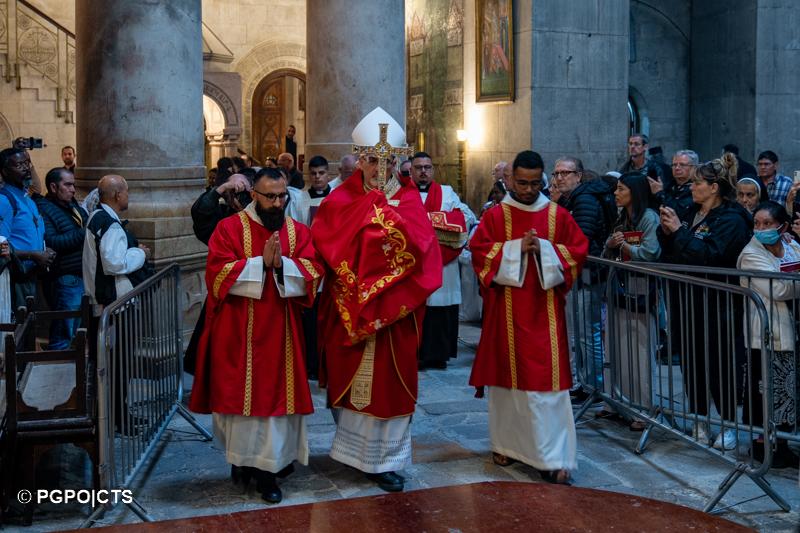On Friday 7th April, Calvary became the centre of the world: the Church of Jerusalem remembered the last act of Jesus’ Passion in the place of his crucifixion, on the rocky mount now incorporated into the Basilica of the Holy Sepulchre.
The Latin Patriarch of Jerusalem, His Beatitude Mons. Pierbattista Pizzaballa, presided the celebration of the “Passion of the Lord”, guiding the faithful in prayer and inviting the religious, the pilgrims and the local Christians to contemplate the wood of the Cross of Christ, to enter the mystery of his Passion with greater intimacy.
The site of the Calvary turned red, the liturgical colour worn by the numerous priests and ministers present and which recalls the blood spilt by Jesus on the cross: the relic of the Holy Cross was placed on the altar of the Latins at the start of the celebration.
The liturgy of Good Friday is in three parts: the liturgy of the Lord, the Adoration of the Cross and the Eucharistic Communion. The readings anticipated the singing of the piece of the Passion according to John (John 18,1 – 19,42), alternated between three Franciscan cantors and the choir of the Custody of the Holy Land, reinforced by the presence of the “St. Angela Choir” of Budapest. Silence accompanied and followed one of the most solemn moments of the celebration, when a cantor proclaimed the verse of the death of Jesus in front of the Greek altar, placed on the rock of Calvary.
In the second part of the celebration, the Holy Cross was presented to the faithful for veneration, with a rite that dates back to the 4th century.
Lastly, the deacons went to the Edicule of the Holy Sepulchre ‒ which became a Tabernacle on Holy Thursday – to take the ciboria with the consecrated hosts and take them in a procession to Golgotha. After saying the Lord’s Prayer, the Eucharist was distributed to the faithful, who through communion with the Lord’s Body, were nourished by the Mystery of the Cross.
At the end of the celebration at the Holy Sepulchre, the Franciscan friars gathered for the traditional practice of the Via Crucis, guided by the Father Custos of the Holy Land, fr. Francesco Patton. The Jerusalemite Via Crucis, a moment of devotion which is felt very deeply by the faithful and who take part in it in great numbers, goes back over the stages of the passion and death of Jesus Christ, from the condemnation to death to the burial: it winds through the city from the Franciscan convent of the Flagellation along the Via Dolorosa to end at the Anastasis, in front of the Edicule of the Holy Sepulchre. On the way, the long procession of Christian pilgrims through the streets of the Old City met the Muslim faithful who were taking the same path towards the al-Aqṣā Mosque, for their ritual Friday prayer in this period of Ramadan.
In the evening, still in the Basilica, there was the “Funeral procession”: it is an actual funeral for Jesus who died on the cross, according to an ancient custom which dates back to the 15th century. The liturgy was presided by the Custos of the Holy Land, fr. Francesco Patton, while the task of the Secretary of the Holy Land, fr. Alberto Joan Pari, is to carry the crucifix to which Jesus is nailed. On Calvary, two deacons remove the crown of thorns from the head of Jesus and the nails pinning his hands and feet. The dead Christ, laid on a sheet, is then carried to the Stone of Unction. There, the Custos of the Holy Land performs the rites of burial described in the Gospels, anointing the body of Christ, as Joseph of Arimathea and Nicodemus did, using the oil and the perfumed substances, blessed in Bethany on Holy Monday.
This is how Good Friday ended, in the meditation and in the silence of the Basilica, awaiting the great Vigil of the Easter of Resurrection which, due to requirements linked to the Status Quo, will be celebrated on Saturday morning.
by: Silvia Giuliano






